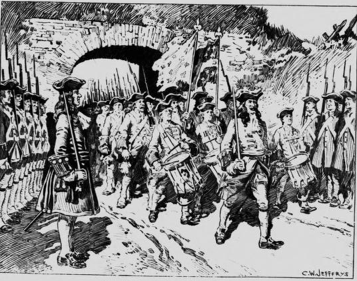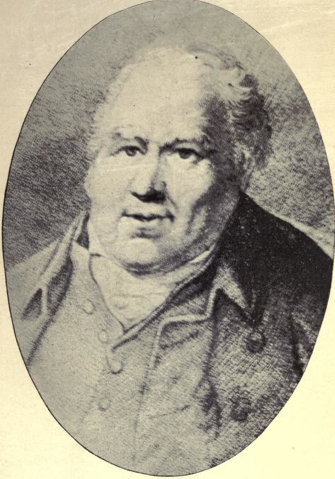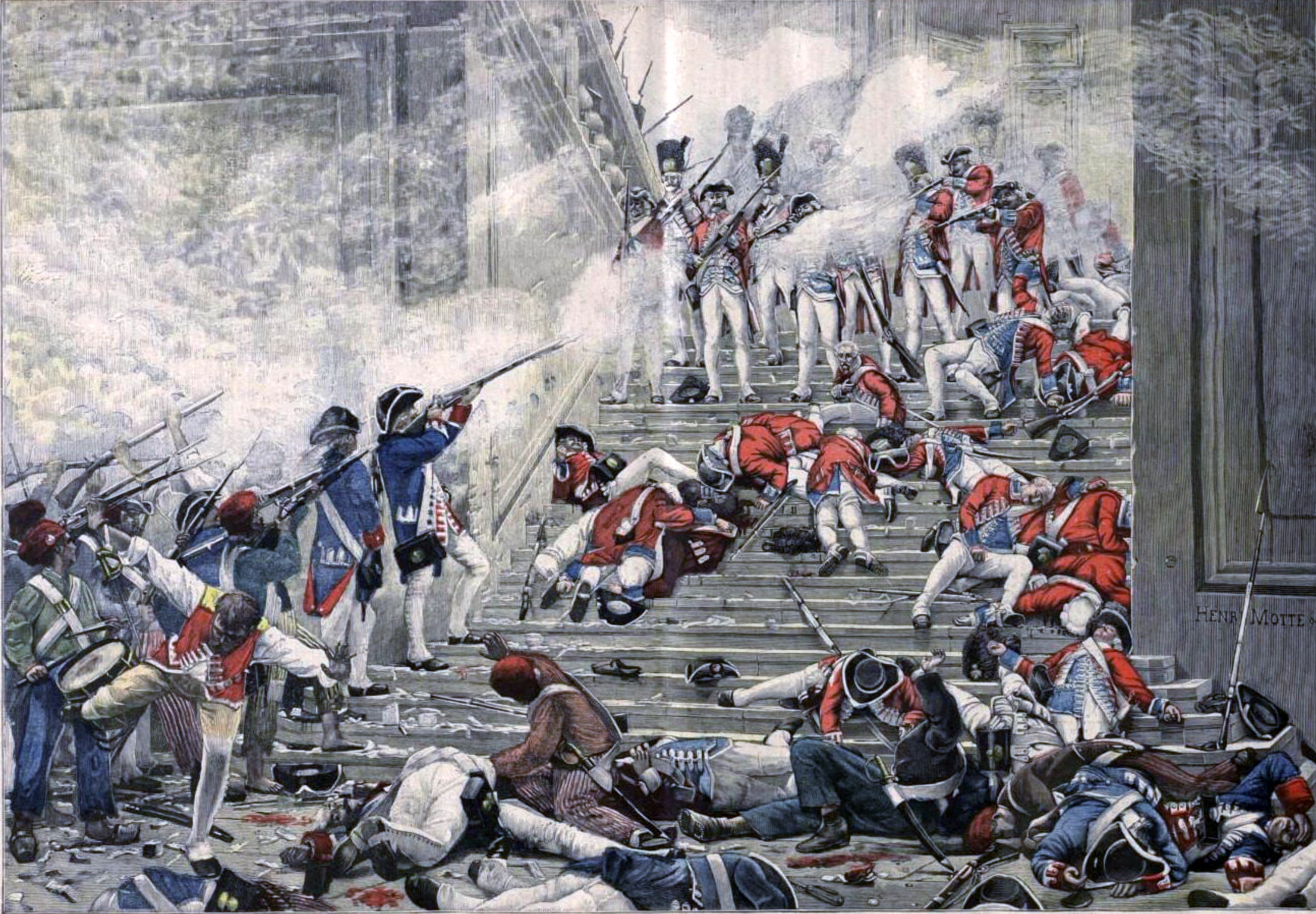|
John Fillis
John Fillis (c. 1724 – July 16, 1792) was a merchant and political figure in Nova Scotia. He was a member of the 1st General Assembly of Nova Scotia and later represented Halifax County from 1768 to 1770, Barrington Township from 1772 to 1785 and Halifax Township from 1785 to 1792. He was accused of being an American Patriot and led the efforts against Governor Francis Legge. He was born in Boston, Massachusetts, the son of John Fillis, and came to Nova Scotia around 1751. He had married Elizabeth Stoddard in 1747. Fillis established a shipping business based in City of Halifax, Halifax, with a branch in Boston. He also set up a distillery in Halifax. In 1756, he married Sarah Cleveland (Rudduck). Fillis was also a justice of the peace. He died in office in Halifax. He is buried in the Old Burying Ground (Halifax, Nova Scotia). See also Nova Scotia in the American Revolution References * {{DEFAULTSORT:Fillis, John 1720s births 1792 deaths 18th-century members o ... [...More Info...] [...Related Items...] OR: [Wikipedia] [Google] [Baidu] |
Nova Scotia
Nova Scotia is a Provinces and territories of Canada, province of Canada, located on its east coast. It is one of the three Maritime Canada, Maritime provinces and Population of Canada by province and territory, most populous province in Atlantic Canada, with an estimated population of over 1 million as of 2024; it is also the second-most densely populated province in Canada, and second-smallest province by area. The province comprises the Nova Scotia peninsula and Cape Breton Island, as well as 3,800 other coastal islands. The province is connected to the rest of Canada by the Isthmus of Chignecto, on which the province's land border with New Brunswick is located. Nova Scotia's Capital city, capital and largest municipality is Halifax, Nova Scotia, Halifax, which is home to over 45% of the province's population as of the 2021 Canadian census, 2021 census. Halifax is the List of census metropolitan areas and agglomerations in Canada, twelfth-largest census metropolitan area in ... [...More Info...] [...Related Items...] OR: [Wikipedia] [Google] [Baidu] |
1st General Assembly Of Nova Scotia
The General Assembly of Nova Scotia was established by a proclamation of the Governor in Council on May 20, 1758. A writ for the election of the 1st General Assembly of Nova Scotia was issued by May 22, returnable at the convening of the assembly on October 2, 1758. The assembly held two sessions, and was dissolved on August 13, 1759. Sessions Dates of specific sessions are under research. Governor and Council *Governor Charles Lawrence *Lieutenant Governor ''vacant''? The members of the Council are currently under research. House of Assembly Officers *Speaker of the House ** Robert Sanderson -left the province for England in 1759. ** William Nesbitt elected August 1, 1759 *Clerk of the House David Lloyd Division of seats Since counties had not been established by this time, the proclamation called for the election of 4 members from Halifax Township, 2 members from Lunenburg Township, and 16 members from the province at large, for a total of 22 members. The election was hel ... [...More Info...] [...Related Items...] OR: [Wikipedia] [Google] [Baidu] |
American Patriot
Patriots (also known as Revolutionaries, Continentals, Rebels, or Whigs) were colonists in the Thirteen Colonies who opposed the Kingdom of Great Britain's control and governance during the colonial era and supported and helped launch the American Revolution that ultimately established American independence. Patriot politicians led colonial opposition to British policies regarding the American colonies, eventually building support for the adoption of the Declaration of Independence, which was adopted unanimously by the Second Continental Congress on July 4, 1776. After the American Revolutionary War began the year before, in 1775, many patriots assimilated into the Continental Army, which was commanded by George Washington and which ultimately secured victory against the British Army, leading the British to end their involvement in the war and acknowledge the sovereign independence of the colonies, reflected in the Treaty of Paris, which led to the establishment of the Unite ... [...More Info...] [...Related Items...] OR: [Wikipedia] [Google] [Baidu] |
Francis Legge
Francis Legge ( 1719–15 May 1783) was a British military officer and colonial official in Nova Scotia during the 18th century. He served as governor of Nova Scotia from 1772 to 1776. During the American Revolution, Legge raised the Royal Nova Scotia Volunteer Regiment. Legge had served in the territory during the Seven Years' War "without distinction or promotion". However, Legge happened to be a relative of the Earl of Dartmouth.Legge, Francis ''Canadian Encyclopedia'' Major Legge was appointed vice-roy of Nova Scotia by Colonial Secretary |
Boston, Massachusetts
Boston is the capital and most populous city in the Commonwealth (U.S. state), Commonwealth of Massachusetts in the United States. The city serves as the cultural and Financial centre, financial center of New England, a region of the Northeastern United States. It has an area of and a population of 675,647 as of the 2020 United States census, 2020 census, making it the third-largest city in the Northeastern United States after New York City and Philadelphia. The larger Greater Boston metropolitan statistical area has a population of 4.9 million as of 2023, making it the largest metropolitan area in New England and the Metropolitan statistical area, eleventh-largest in the United States. Boston was founded on Shawmut Peninsula in 1630 by English Puritans, Puritan settlers, who named the city after the market town of Boston, Lincolnshire in England. During the American Revolution and American Revolutionary War, Revolutionary War, Boston was home to several seminal events, incl ... [...More Info...] [...Related Items...] OR: [Wikipedia] [Google] [Baidu] |
City Of Halifax
A city is a human settlement of a substantial size. The term "city" has different meanings around the world and in some places the settlement can be very small. Even where the term is limited to larger settlements, there is no universally agreed definition of the lower boundary for their size. In a narrower sense, a city can be defined as a permanent and Urban density, densely populated place with administratively defined boundaries whose members work primarily on non-agricultural tasks. Cities generally have extensive systems for housing, transportation, sanitation, Public utilities, utilities, land use, Manufacturing, production of goods, and communication. Their density facilitates interaction between people, government organisations, government organizations, and businesses, sometimes benefiting different parties in the process, such as improving the efficiency of goods and service distribution. Historically, city dwellers have been a small proportion of humanity overall, bu ... [...More Info...] [...Related Items...] OR: [Wikipedia] [Google] [Baidu] |
Old Burying Ground (Halifax, Nova Scotia)
The Old Burying Ground (also known as St. Paul's Church (Halifax), St. Paul's Church Cemetery) is a historic cemetery in Halifax, Nova Scotia, Canada. It is located at the intersection of Barrington Street and Spring Garden Road in Downtown Halifax. History The Old Burying Ground was founded in 1749, the same year as the settlement, as the town's first burial ground. It was originally non-denominational and for several decades was the only burial place for all Haligonians. (The burial ground was also used by St. Matthew's United Church (Halifax), St. Matthew's United Church). In 1793 it was turned over to the Anglican St. Paul's Church (Halifax), St. Paul's Church. The cemetery was closed in 1844 and the Camp Hill Cemetery established for subsequent burials. The site steadily declined until the 1980s when it was restored and refurbished by the Old Burying Ground Foundation, which now maintains the site and employ tour guides to interpret the site in the summer. Ongoing restorat ... [...More Info...] [...Related Items...] OR: [Wikipedia] [Google] [Baidu] |
Nova Scotia In The American Revolution
The Province of Nova Scotia was heavily involved in the American Revolutionary War (1775–1783). At that time, Nova Scotia also included present-day New Brunswick until that colony was created in 1784. The Revolution had a significant impact on shaping Nova Scotia, "almost the 14th American Colony". At the beginning, there was ambivalence in Nova Scotia over whether the colony should join the Americans in the war against Britain. Largely as a result of American privateer raids on Nova Scotia villages, as the war continued, the population of Nova Scotia solidified their support for the British. Thousands of Loyalist refugees fled to Nova Scotia during the war, and many were resettled in the region after the signing of the 1783 Treaty of Paris as "United Empire Loyalists". Context In Nova Scotia a number of former New England residents objected to the Stamp Act 1765, but recent British immigrants and London-oriented business interests based in Halifax, the provincial capital, ... [...More Info...] [...Related Items...] OR: [Wikipedia] [Google] [Baidu] |
Dictionary Of Canadian Biography Online
The ''Dictionary of Canadian Biography'' (''DCB''; ) is a dictionary of biographical entries for individuals who have contributed to the history of Canada. The ''DCB'', which was initiated in 1959, is a collaboration between the University of Toronto and Laval University. Fifteen volumes have so far been published with more than 8,400 biographies of individuals who died or whose last known activity fell between the years 1000 and 1930. The entire print edition is online, along with some additional biographies to the year 2000. Establishment of the project The project was undertaken following a bequest to the University of Toronto from businessman James Nicholson for the establishment of a Canadian version of the United Kingdom's ''Dictionary of National Biography''. In the spring of 1959, George Williams Brown was appointed general editor and the University of Toronto Press, which had been named publisher, sent out some 10,000 announcements introducing the project. Work started in ... [...More Info...] [...Related Items...] OR: [Wikipedia] [Google] [Baidu] |
1720s Births
Seventeen or 17 may refer to: *17 (number) * One of the years 17 BC, AD 17, 1917, 2017, 2117 Science * Chlorine, a halogen in the periodic table * 17 Thetis, an asteroid in the asteroid belt Literature Magazines * ''Seventeen'' (American magazine), an American magazine * ''Seventeen'' (Japanese magazine), a Japanese magazine Novels * ''Seventeen'' (Tarkington novel), a 1916 novel by Booth Tarkington *''Seventeen'' (''Sebuntiin''), a 1961 novel by Kenzaburō Ōe *'' Seventeen'' (''Kuraimāzu hai''), a 2003 novel by Hideo Yokoyama * ''Seventeen'' (Serafin novel), a 2004 novel by Shan Serafin Stage and screen Film * ''Seventeen'' (1916 film), an American silent comedy film *'' Number Seventeen'', a 1932 film directed by Alfred Hitchcock * ''Seventeen'' (1940 film), an American comedy film *'' Stalag 17'', an American war film *''Eric Soya's '17''' (Danish: ''Sytten''), a 1965 Danish comedy film * ''Seventeen'' (1985 film), a documentary film * ''17 Again'', a 2009 film wh ... [...More Info...] [...Related Items...] OR: [Wikipedia] [Google] [Baidu] |
1792 Deaths
Events January–March * January 9 – The Treaty of Jassy ends the Russian Empire's war with the Ottoman Empire over Crimea. * January 25 – The London Corresponding Society is founded. * February 18 – Thomas Holcroft produces the comedy ''The Road to Ruin (play), The Road to Ruin'' in London. * February 20 ** The Postal Service Act, establishing the United States Postal Service, United States Post Office Department, is signed by President George Washington.''Harper's Encyclopaedia of United States History from 458 A. D. to 1909'', ed. by Benson John Lossing and, Woodrow Wilson (Harper & Brothers, 1910) p169 ** Parliament House, Dublin catches fire during a legislative session. "Although in imminent danger of the roof falling in," it is noted later, "the House did not adjourn until a proper motion had been put and carried in the affirmative.""Fires, Great", in ''The Insurance Cyclopeadia: Being an Historical Treasury of Events and Circumstances Connect ... [...More Info...] [...Related Items...] OR: [Wikipedia] [Google] [Baidu] |





